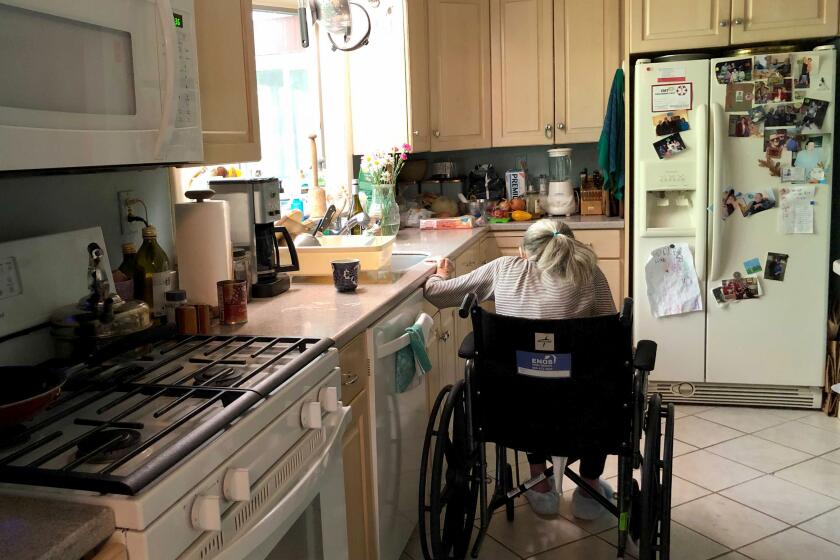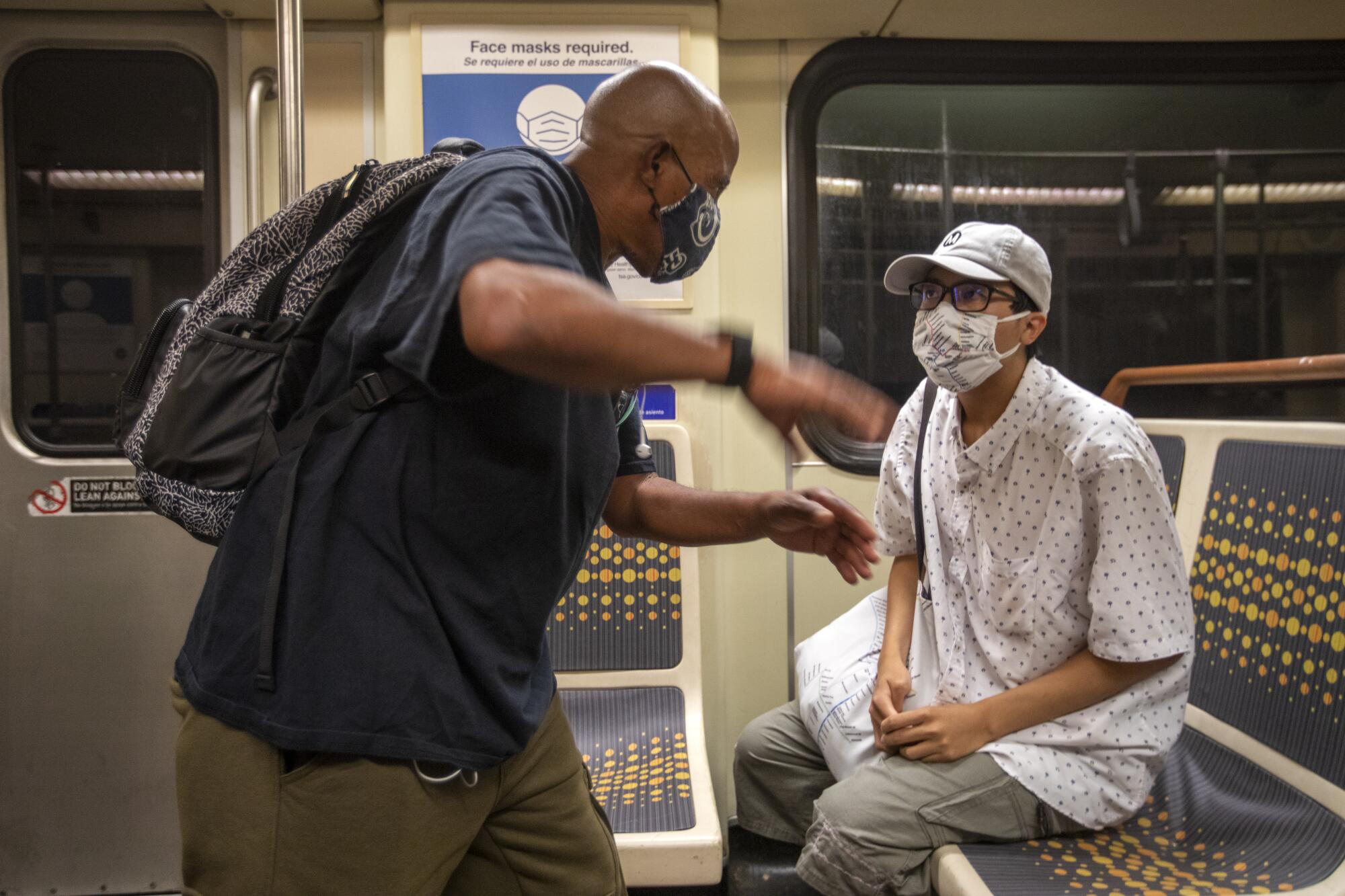
- Share via
Remember those pandemic days when our streets and our freeways were wide open? When in no time at all you could drive from anywhere to the beach? When the air seemed to clear and allow us to glimpse a different, more breathable and more free-flowing city?
Wasn’t it beautiful? Wouldn’t it have been great if we could have made it last?
Instead, it seems as if, in one second flat, we went from 60 to 0, returning to traffic jams and honking horns and everyone back behind the steering wheel, grumpy and distracted, inching along together, going nowhere fast.
We have a far-from-perfect public transportation system in Los Angeles. It doesn’t serve every community equally. It doesn’t go everywhere we want to go. Still, it does go many places, and I wish more people who didn’t have to use it out of economic necessity would start choosing to do so and to leave their cars parked and so help reduce the load on our environment and our roadways.
How do I pay? What is the fare? How often do the trains come? It can be intimidating at first, of course. You might mean to take a ride somewhere but, faced with these knowledge gaps, end up deciding to summon an Uber or drive.
That’s why I wish all of you who hesitate could take a ride or two with the person I ventured out with on Wednesday. Kenny Uong doesn’t work for Metro, but he’s one of its greatest ambassadors.
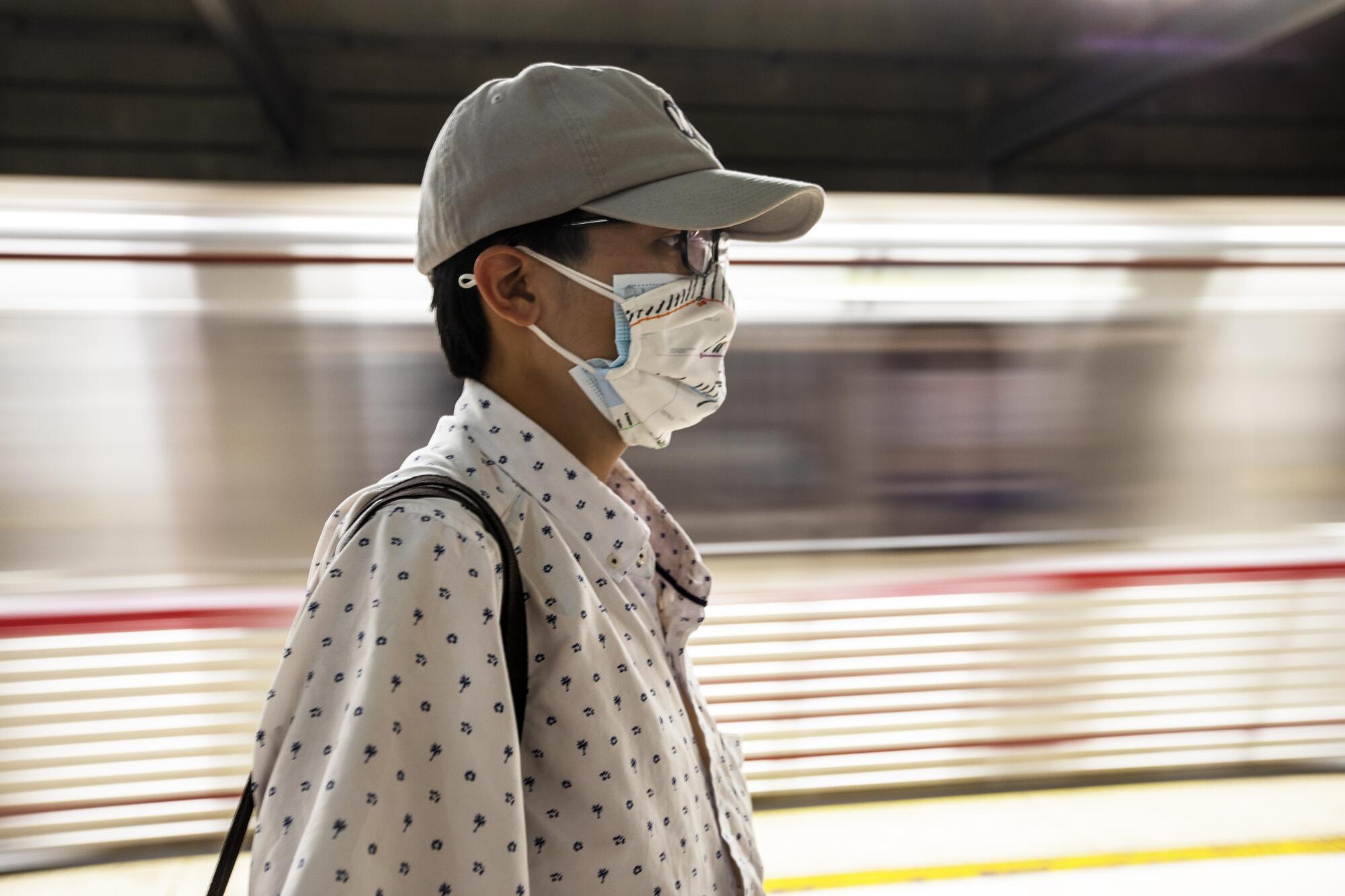
When we met outside the Metro station in North Hollywood, he was easy to spot. He wore a cap with an M for Metro and a mask sporting a map of Metro rail lines. He carried a similarly decorated Metro tote bag. Even his cellphone cover was Metro-themed.
After spending the day riding with him, I now wish everyone could. I wish he could spread, door to door, both his love of public transit and his desire that we work together to improve it.
At the ripe old age of 21, Uong is an authority on public transit in Los Angeles. Since his protective parents first allowed him to take trips on his own at 16, he has spent all his free time on buses and trains — often in the company of other transit enthusiasts he first became friends with online. He takes public transit to the beach to breathe in the ocean air, to Chinatown in search of the delicious. He once took it to Bakersfield and back in a day. He had to set out at 5 in the morning, but he was home by 8 p.m.
Public transit opened up Uong’s world. The pandemic temporarily shut it down because his parents are immunocompromised. To protect them, he watched “ride along” public transit videos posted on YouTube as he stayed off buses and trains for 436 days. That’s the kind of detail noted by Uong, who notes everything. In fact, one of his most frequent expressions is “Noted.”
Uong just finished his junior year at Cal State Northridge, where he studies urban and transit planning. As we hopped on and off trains and a bus from North Hollywood to downtown and back, he told me the history of each line we were on and when each station we stopped at first opened.
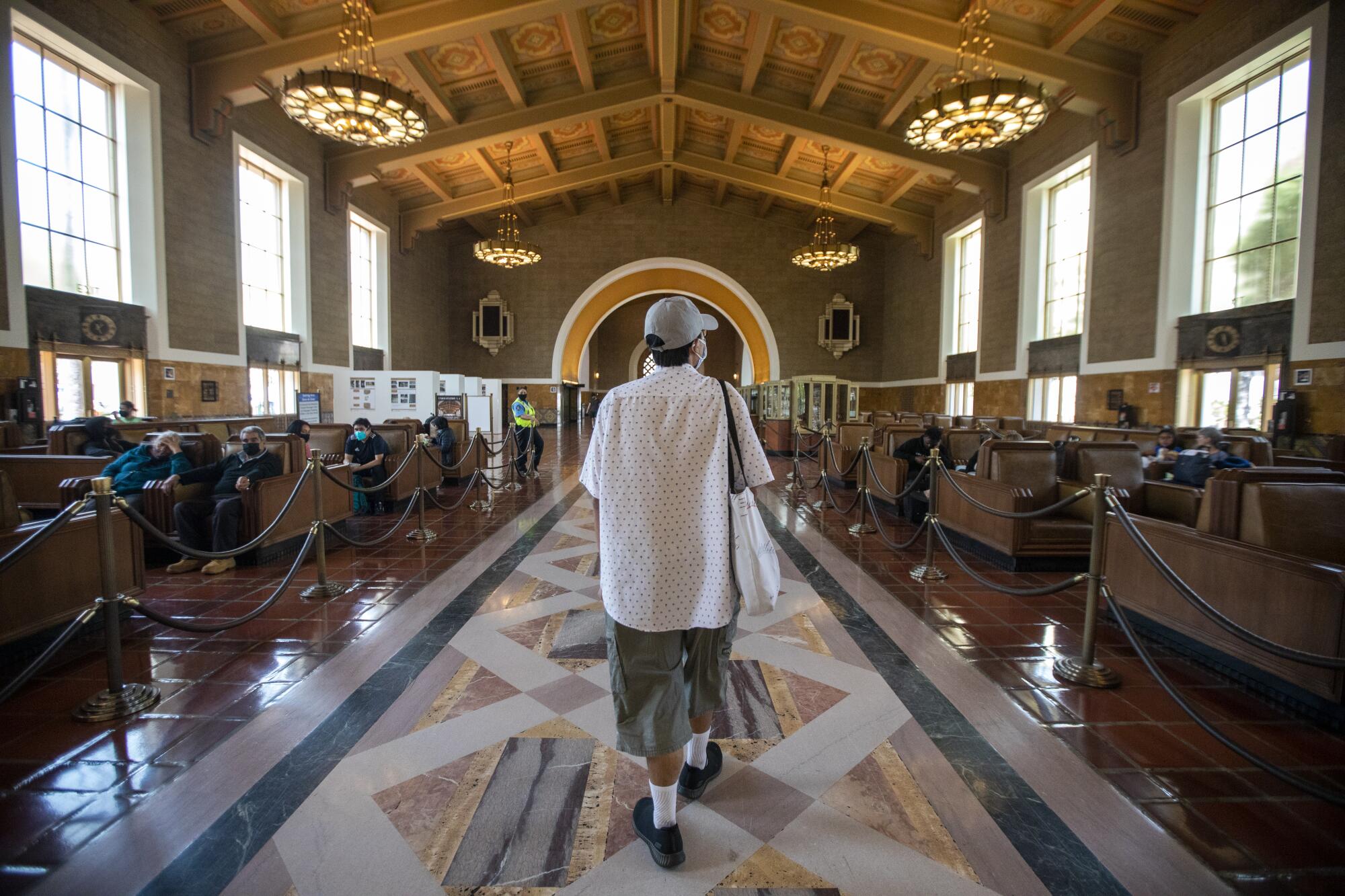
He walked me through Union Station, describing how it grew over time. He told me which buses ran only on weekends. He talked about how he especially loves to look out bus windows, watching one neighborhood flow into the next. He said more effort had to be made to highlight such relaxing pleasures, to make L.A. public transit more “intriguing” to drivers.
I suggested he could sideline as a personal public-transit coach. He could come to people’s homes and escort them on public transit to introduce them to the great many places they could easily reach without reaching for their car keys. I also suggested an online site called Ask Kenny. Because if you ask him how to get from anywhere to anywhere in L.A. County on public transit, he will answer without pause. He won’t have to look it up. It’s all in his head.
Before the pandemic, my mother-in-law was feisty and outgoing. When we recently reunited after a shut-in year, I was floored by the scope of her loss.
Uong first fell in love with public transportation when he was about 3 years old. His parents didn’t have a car. They still don’t. They came to California from Vietnam in 1998, before he was born. From their one-bedroom apartment in Glendale, his father biked to work at a factory that made airplane parts. His mother stayed at home for the kids.
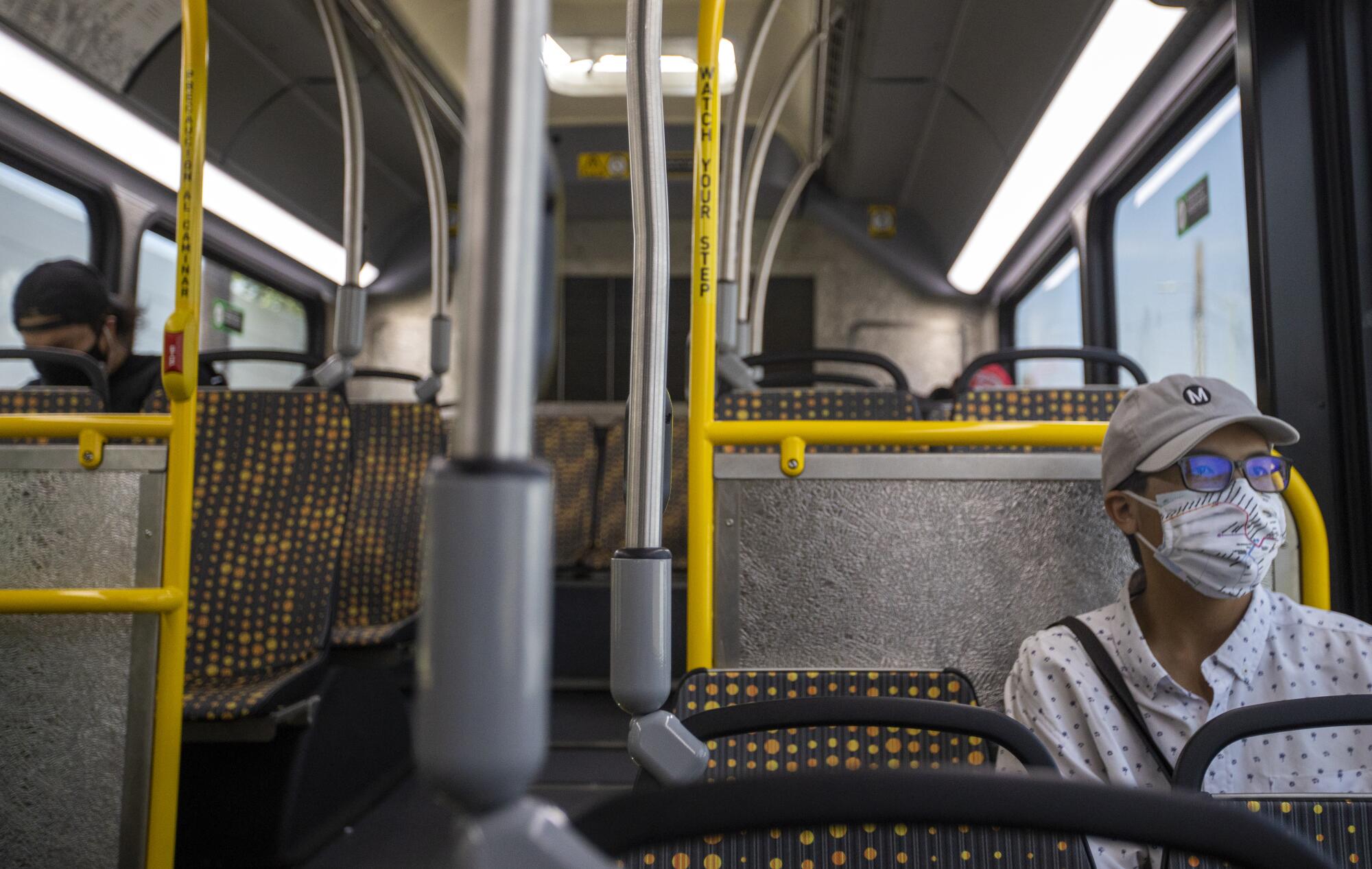
And on Sundays the family would travel to Chinatown on the 94 bus to shop for groceries. As they hauled home a cart often weighed down by a 50-pound bag of rice, surrounded by fish sauce, hoisin sauce and noodles, Uong gazed, rapt, out the bus windows.
When he was about 5, he started collecting Los Angeles bus and train schedules and Metro brochures. He soon started mapping out the routes and schedules of the buses his family would take whenever they had to go anywhere.
“Kenny was pretty much our Google Maps. He was our transit app before any of us had access to a transit app,” said his proud older sister, An, a 27-year-old writer and editor who now lives in Providence, R.I.
By the time he was 10, Uong had memorized the entire L.A. public transit system.
His sister would test him by tossing out a bus route number. He couldn’t be tricked.
“She would give like a random number and I would say, ‘Nonexistent,’” he told me.
His sister also told me about the imaginary cities with imaginary transit systems he used to create in their apartment, her desk one neighborhood, each chair another. By sixth or seventh grade, she said, he was reimagining the existing transit system, coming up with new stops and lines to make it run more efficiently. Over time, he added Metro TAP cards, models of trains and buses, bus transfers and transit-themed pins to his collections.
At Thomas Jefferson Elementary School and Herbert Hoover High School, Uong, who is soft-spoken and shy, didn’t broadcast his transit passion. But true love has a way of outing itself.
For his 10th-grade English class, he wrote a poem he called “Metro is the way to go,” which began:
Traveling in Los Angeles is not a fuss,
If everyone rides Metro Rail or Metro Bus.
Going with a friend, you can’t say no,
Since Metro is the way to go!
In ceramics class in 11th grade, asked to make a word tile centered on something that deeply resonated with him, he shaped the word “Mobility” in clay, surrounded by images of a traffic signal, a bicycle and a bus and a roadway.
His view of transit was growing steadily more sophisticated.
For a long time, growing up, his dream was to be a Metro planner. Now as a young man, he speaks instead of wanting to join a nonprofit or advocacy group to promote transit justice — to make the city’s sidewalks and streets safer, to make sure all communities have good transit access, to make sure that no one has to walk too far to get to or wait too long for a train or a bus, and that everyone who has to wait can do so comfortably, at a shaded, well-sheltered stop.
In a way, I’ve witnessed Uong’s transit evolution since his first solo trips, when he also joined Twitter and began taking the rest of us along on his travels. He still does so, almost every day. But now he also speaks out not just about how much he loves our public transit system but also about how it needs to serve everyone better.
That will take more of us riding and advocating with him — which is why I thought about him last week as I sat in my car, stuck behind a traffic signal as it turned from green to red to green to red to green to red to green to red.
Wasn’t it wonderful when so many cars were off the road that we could just zip from Point A to Point B?
It could happen again if more of us chose to drive less.
More to Read
Sign up for Essential California
The most important California stories and recommendations in your inbox every morning.
You may occasionally receive promotional content from the Los Angeles Times.
